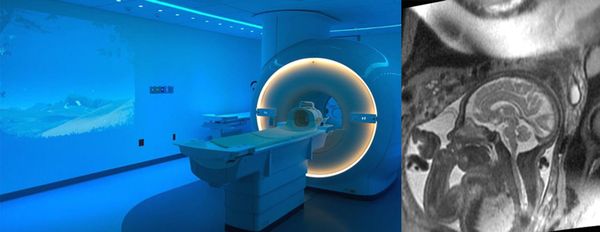What is fetal MRI?
Although ultrasound is a routine part of prenatal care, it is limited in its ability to visualize the developing brain and detect abnormalities in brain development. With recent technological advances, fetal magnetic resonance imaging (MRI) has become a safe and efficient way to evaluate the fetal brain. Fetal MRI allows us to evaluate the fetal brain with greater detail compared to ultrasound. As a result, fetal MRI can detect abnormalities in the fetal brain that are not visible on prenatal ultrasound. Because of this, fetal MRI is being increasingly performed as part of clinical care when a brain abnormality is suspected on prenatal ultrasound and/or when the fetus is at increased risk of developing a brain abnormality.
When should I have a fetal MRI?
Most women undergo fetal MRI when an abnormality is suspected on ultrasound. Sometimes ultrasound has difficulties visualizing the fetal brain structures, usually because of technical difficulties, and so your obstetrician may recommend fetal MRI if that is the case. Some women are referred for fetal MRI when there is a condition in the pregnancy that may affect the fetal brain, such as twin pregnancy complications or fetal congenital heart disease. In families where there is a history of neurodevelopmental disorders, then fetal MRI may be helpful even if the ultrasound is normal. You should discuss fetal MRI with your physician if you feel it may be helpful to you.
How do I get a fetal MRI?
You should ask your obstetrician or perinatologist if fetal MRI may be helpful to you. Fetal MRIs are typically performed at large tertiary medical centers by MR technologists and are interpreted by pediatric neuroradiologists with additional training in fetal brain imaging.
How do I prepare for a fetal MRI?
In order to get high quality images, it is important to minimize fetal motion during the MRI. We do not think it is not necessary for the mother to take any medications for this procedure. Fetuses tend to move more after the mother has eaten. Therefore, we usually recommend that women do not eat or drink anything for four hours before the fetal MRI appointment in order to minimize fetal motion during the MRI. However if you know that your fetus moves more if you haven’t eaten for four hours, then you should adjust your eating schedule behavior accordingly.
You do NOT need to have a full bladder for fetal MRI. We prefer that you empty your bladder before fetal MRI so that you will be more comfortable during the scan.
We have observed that fetuses move less when the mom is comfortable and relaxed, so please tell us if we can do anything to help you be more comfortable and relaxed during the MRI. We do offer movies and music, so if you have your favorite movie or music then please bring it as a CD or DVD and give it to the technologist who is doing your MRI.
What happens during a fetal MRI?
For the fetal MRI, an MR technologist will escort you into the MRI room. You will be asked to lie on your back on the MRI table and the technologist will wrap a plastic cushion around your belly. If lying on your back is very uncomfortable, then please tell the technologist and we can perform the MRI with you propped on your side (although images are usually better when women are lying on their back). You will be given a button that you can squeeze if you are uncomfortable during the MRI scan. The technologist will also check in with you during the MRI scan. During the MRI scan, you will hear some loud noises and the MRI table may vibrate. We will give you ear plugs or headphones to minimize the noise from the scanner. Previous studies have shown that MRI does not affect the hearing of the fetus. During most of the scan, the technologist will instruct you to breathe regularly. During some of the scan (usually towards the end of the scan), the MR technologist will give you instructions to hold your breath. The MRI scan itself takes anywhere from 30-45 minutes (twins could take longer), although it may take extra time to get you well positioned on the table in order to get high quality images.
Although having a fetal MRI can be stressful, it is most important for you to be comfortable and try to stay as relaxed as possible.
When will I get my fetal MRI results?
After your fetal MRI is finished, the images will be interpreted by a pediatric neuroradiologist with expertise in fetal MRI. The results are usually available by the end of the day. You should call your perinatologist and/or OB to receive the results of your fetal MRI.
How much experience does UCSF have with fetal MRI?
At UCSF we have performed over 2800 fetal MRI scans, mostly of the brain and spine. We are internationally recognized for our experience in performing and interpreting fetal MRI. Our radiologists have lectured world wide on fetal MRI. We have also trained many radiologists, both locally and internationally, in performing and interpreting fetal brain MRI.
